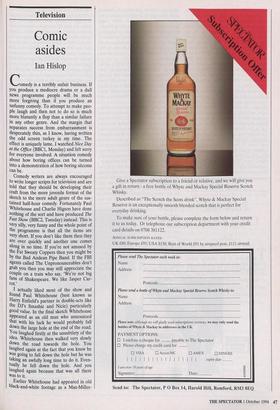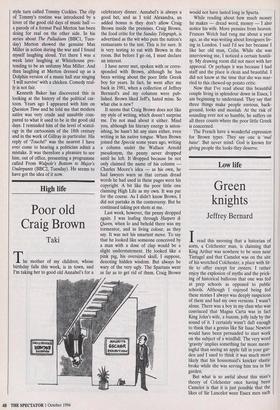Television
Comic asides
Ian Hislop Comedy is a terribly unfair business. If you produce a mediocre drama or a dull news programme people will be much more forgiving than if you produce an unfunny comedy. To attempt to make peo- ple laugh and then not to do so is much more blatantly a flop than a similar failure in any other genre. And the margin that separates success from embarrassment is desperately thin, as I know, having written the odd screen turkey in my time. The effect is uniquely lame. I watched Nice Day at the Of (BBC1, Monday) and felt sorry for everyone involved. A situation comedy about how boring offices can be turned Into a demonstration of how boring sitcoms can be.
Comedy writers are always encouraged to write longer scripts for television and are told that they should be developing their craft from the more juvenile format of the sketch to the more adult genre of the sus- tained half-hour comedy. Fortunately Paul Whitehouse and Charlie Higson have done nothing of the sort and have produced The Fast Show (BBC2, Tuesday) instead. This is very silly, very funny and the whole point of the programme is that all the items are very short. If you don't like them then they are over quickly and another one comes along in no time. If you're not amused by the Fat Sweaty Coppers then you might be by the Bad Andean Pipe Band. If the FBI agents called The Unpronounceables don't grab you then you may still appreciate the couple on a train who say, 'We're not big fans of Shakespeare. We like Jasper Car- rot.'
I actually liked most of the show and found Paul Whitehouse (best known as Harry Enfield's partner in double-acts like the DJ's Smashie and Nicie) particularly good value. In the final sketch Whitehouse appeared as an old man who announced that with his luck he would probably fall down the large hole at the end of the road. You laughed firstly at the unsubtlety of the idea. Whitehouse then walked very slowly down the road towards the hole. You laughed again at the fact that you knew he was going to fall down the hole but he was taking an awfully long time to do it. Even- tually he fell down the hole. And you laughed again because that was all there was to it.
Earlier Whitehouse had appeared in old black-and-white footage as a Max-Miller- style turn called Tommy Cockles. The clip of Tommy's routine was introduced by a lover of the good old days of music hall a parody of a format Paul Merton has been doing for real on the other side. In his series about The Palladium (BBC1, Tues- day) Merton showed the genuine Max Miller in action during the war and I found myself laughing aloud. Yet there I was a week later laughing at Whitehouse pre- tending to be an unfunny Max Miller. And then laughing at Merton dressed up as a Dolphin version of a music hall star singing `I will survive' with a chicken. Comedy real- ly is not fair.
Kenneth Baker has discovered this in looking at the history of the political car- toon. Years ago I appeared with him on Question Time and he told me that modern satire was very crude and unsubtle com- pared to what it used to be in the good old days. I reminded him of the level of scatol- ogy in the cartoonists of the 18th century and in the work of Giltray in particular. His reply of 'Touches' was the nearest I have ever come to hearing a politician admit a mistake. It was therefore a pleasure to see him, out of office, presenting a programme called From Walpole's Bottom to Major's Underpants (BBC2, Tuesday). He seems to have got the idea of it now.



























































 Previous page
Previous page